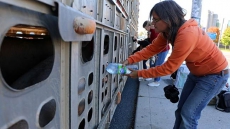VANCOUVER — A tag hanging from a dead man's left toe says the cause of death was an overdose of fentanyl, "unknowingly taken with other drugs."
The cadaver draped in a white sheet is displayed in transit ads funded by the Vancouver Police Foundation and represents 922 people who died in British Columbia from drug overdoses last year alone.
A spiralling number of deaths, often involving the painkiller fentanyl, prompted the provincial government to declare a public health emergency on April 14, 2016, and to launch its own awareness campaign on TV, radio, Facebook, transit and at bars and restaurants.
The province rolled out its latest campaign this week, featuring Facebook ads about a mother whose son died of an overdose, users who say they struggled with the shame of addiction until they got treatment, and the importance of carrying naloxone, a medication used to reverse overdoses.
The state of emergency remains in effect after a year, but fatalities have continued, with a monthly high of 142 deaths in December reported by the BC Coroners Service.
It said the number of deaths in February was down slightly from 117 in January but 219 people died in the first two months of this year, up from 143 fatalities during the same period last year.
Many of the dead had no idea that fentanyl was cut into their drugs of choice, including heroin, cocaine, crack, ecstasy and meth, and that merely a speck of the powerful opioid can kill.
Provincial health officer Perry Kendall said that after a decline in overdoses between March and September last year, another even more potent drug, carfentanil, was responsible for an increase in deaths starting in November.
"That was just a sickening feeling," Kendall said.
He said the don't-use-alone message is still not getting out to people who use illicit drugs despite measures that have been taken, such as more distribution of naloxone, lifting restrictions on doctors prescribing the treatment drug suboxone, and the opening of overdose prevention sites where people can ingest drugs under supervision.

In November, the federal government banned the importation of six precursor chemicals used to make fentanyl, and Kendall said the province is pushing for legislation that would allow Canada Border Services Agency officials to open mail under 30 grams because it could contain small amounts of fentanyl shipped from countries including China.
A bill is before the House of Commons.
Addressing the public's stigma around health-care spending on drug addiction has also been a challenge, Kendall said.
"It's like all these emergency rooms full of people who are dying from overdoses are creating waiting problems for real health issues. Either you see addiction as a health issue, which it is, or you see it as people doing bad things and they don't deserve our compassion and resources," he said.

"I do think we're now seeing addiction as a health issue and not just a moral issue or a criminal issue."
Kendall said the next step for the province will be to provide treatment with opioid substances, such as the painkiller hydromorphone and injectable heroin.
Patients take those two drugs under supervision at the Crosstown clinic in Vancouver, the only such facility in North America, but lead physician Dr. Scott MacDonald said so many people who haven't responded to other treatment could benefit if the program were expanded.
The BC Centre on Substance Use is developing guidelines regarding that move on behalf of the Health Ministry, said Cheyenne Johnson, a nurse and clinical director at the centre.
She said training family doctors to screen and diagnose opioid addiction will be key to addressing the high number of overdose deaths in British Columbia, and that the centre has taken on that task.
Since last October, nearly 1,100 doctors have been educated at 25 locations around the province to recognize addiction and refer patients for treatment, Johnson said.
The College of Physicians and Surgeons of British Columbia has so far offered basic addiction training, but as of June 5 the centre will fully take over the effort through an online course in hopes of reaching as many doctors as possible, she said.
Johnson said some doctors who have taken the training shared that they were "scared" to deal with patients hooked on opioids because they lacked adequate medical expertise.
"The overdose epidemic has really shone a light on how much untreated addiction we have in the province of British Columbia, so not only people who have substance use disorders but people who might use recreationally," she said.
"When you go into private treatment recovery centres, what you see is RCMP officers, you see firefighters, you see people who work in oil and gas, teachers, and you see nurses. You see everybody."


